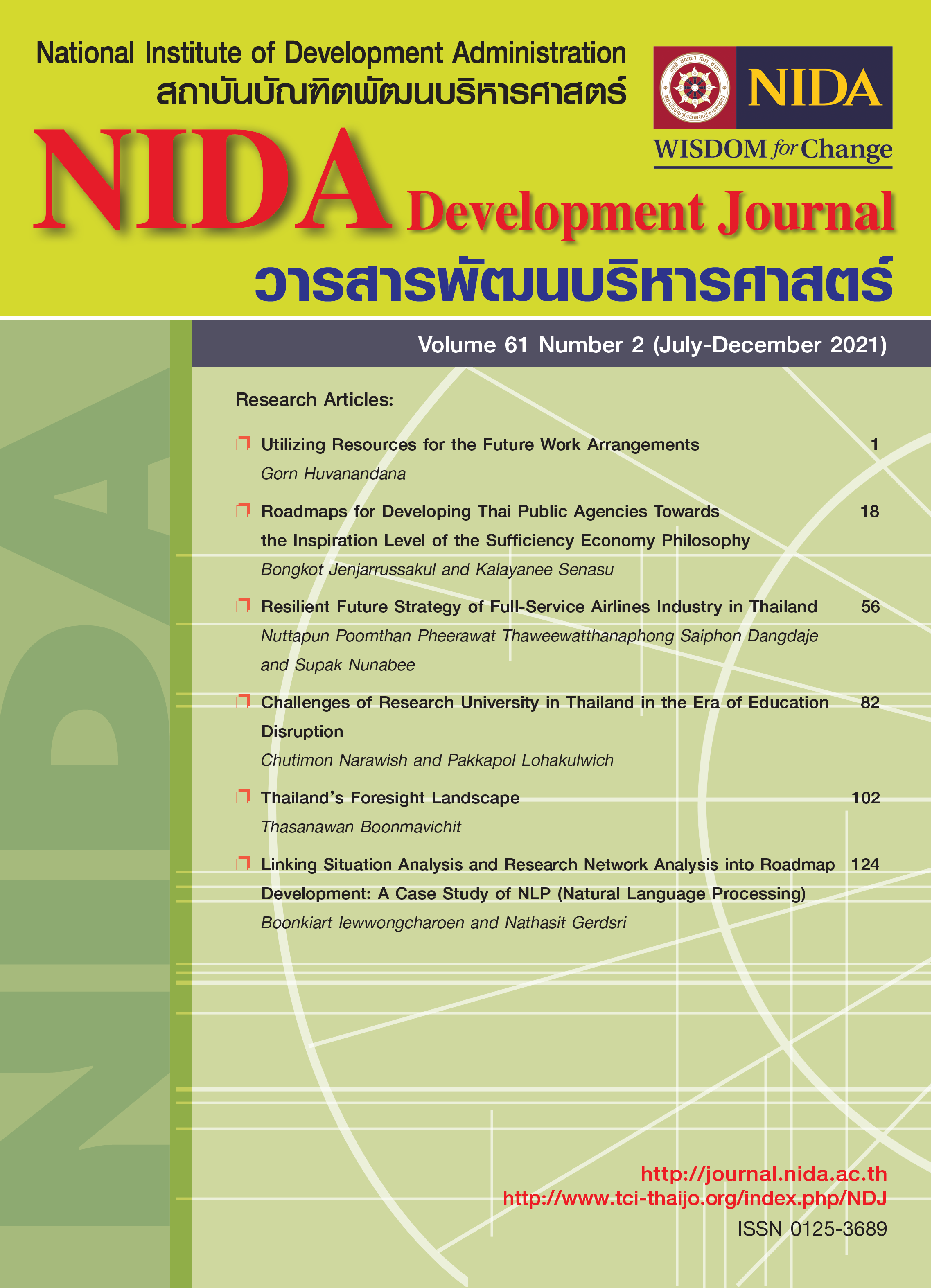Challenges of Research University in Thailand in The Era of Education Discruption
Keywords:
Challenges, Education Disruption, Academic Renewal, Thailand UniversityAbstract
Higher education is undergoing a period of significant transformation. While older, more prestigious universities may be less impacted by these changes or experience their effects more slowly than other institutions, practically all universities are currently involved in attempts to adapt and change as the higher education market, finances, and technology advance. These adjustments, which may be challenging for big and complicated institutions with a strong sense of their history and reputation, might meet both internal and external pushback. Although the Thailand university system is in many respects stable, strong, and relatively well-functioning, this article is one result of the nation's recognition that universities may lack the strategic and institutional adaptability that the future will need. Due to the widespread Covid19 pandemic, the rapid shift to digital teaching and remote learning, and the resulting economic and labor market disruption, along with the increasing uncertainty, complexity, and potential turmoil that societies were already experiencing prior to the pandemic, the importance of academic leadership and strategic renewal of education has been emphasized. Several major reforms of Thailand's university system have been accomplished in recent decades. In the immediate postwar era, enormous expansions of universities were undertaken to meet the demands created by fast industrialization, expanding welfare state goals, and the Cold War in particular. They accomplished this via the modernization and reorganization of research financing, as well as increased mobility between universities and society organizations like as businesses, government agencies, and hospitals. Thailand 's neutrality throughout the Cold War and its entry into international markets were secured as a result of this.
References
Autor, D.H. (2015). Why are there still so many jobs? The history and future of workplace automation. The Journal of Economic Perspectives, 29:3, 3-30.
Bound, H., Sadik, S., Evans, K. and Karmel, A. (2018). How Non-Permanent Workers Learn and Develop: Challenges and Opportunities, London: Routledge.
Brown, P., Lauder, H. and Ashton, D. (2011). The Global Auction: The Broken Promises of Education, Jobs and Incomes. New York: Oxford University Press.
Brown, P., Lauder, H. and Cheung, S.Y. (2020). The Death of Human Capital: Its Failed Promise and How to Renew It. New York: Oxford University Press.
Brown, P., Lloyd, C. and Souto-Otero, M. (2018). The Prospects for Skills and Employment in an Age of Digital Disruption: A Cautionary Note. Oxford: SKOPE. Available at http://www.skope.ox.ac.uk/wp-content/uploads/2018/11/Brown-Lloyd-and-Souto-Otero-2018.-The-prospects-for-skills-and-employment-in-an-age-of-digital-disruption.pdf
Brown, P., Sadik, S., Lauder, H., Souto-Otero, M., Sung, J. & Freebody, S. (2018). Talent Management in an Age of Digital Disruption: Implications for Skills Policy. Singapore: Institute for Adult Learning.
Brown Review. (2019) Review of Digital Innovation: Delivering Economic Transformation for a Better Future of Work for Wales. Available at https://gov.wales/review-digital-innovation-final-report
Chaimayo, T. (2016). The lesson from supervision by using lesson study innovation for enhancing strong school-based supervision. Journal of Educational Supervision and Development, 1(1), 79-87.
Chantarasombat, C. (2018). Coaching teams: How to improve educational quality? KhonKaen Provincial Education Office and Pitchayabundit College.
Chantarasombat, C.,Sombatsakulkit E. (2021). Doctoral program Learning Module on Developing Leading Secondary School Techers in Creative Thinking Enhancement of Students’ Learning Activities in Thailand. International Journal of Higher Education, 10(3), 138-149. http://doi.org/10.5430/ijhe.v10n3p138
Donbundit, P. (2018). The development of learning model for analytical chemistry course in higher education by discovery cycle. (Unpublished doctoral dissertation). Bangkok: Graduate School, Srinakarinwirot University.
Donpraipan,S.(2013). The development of learning lesson titled sufficiency economy philosophy for matayomsuksa 2 students. (Unpublished mater thesis). Faculty of Induatrial Education and Technology, King Monkut’s Institute of Technology Ladkrabang (KMITL).
Ford, M. (2015). The Rise of the Robots: Technology and the Threat of Mass Unemployment. London: Oneworld.
Freeman, C. and Louca, F. (2001) As Time Goes By: From the Industrial Revolution to the Information Revolution, Oxford: Oxford University Press, pp.143-4.
Frey, C.B. and Osborne, M.A. (2013). The Future of Employment: How Susceptible Are Jobs To Computerisation? Available at http://www.oxfordmartin.ox.ac.uk/downloads/academic/The_Future_of_Employment.pdf
Gog, S. J. (2016). Rethinking the Human Capital Development Model for the Future of Work. Singapore: Head Foundation. http://www.headfoundation.org/papers/_2016_1)_Rethinking_The_Human_Capital_Development_Model_For_The_Future_Of_Work.pdf
Government of Singapore. (2017). Report of the Committee on the Future Economy of Singapore: Pioneers of the Next Generation. Available at https://www.gov.sg/microsites/future-economy.
Head, S. (2014). Mindless: Why Smarter Machines Are Making Dumber Humans. New York: Basic Books.
Inruengsri, S. (2011). The development of learning lesson in Life and Thai Culture Course of High Vocational Certificate Students in Automotive Industry Technical College. (Unpublished master thesis). Pra Nakon Sri-Ayutthaya: Ayutthaya Rajabhat University.
Mason, P. (2015). Postcapitalism: A Guide to the Future. London: Allen Lane.
McGown, M.A. and Andrews, D. (2015). Skills Mismatch and Public Policy in OECD Countries, OECD, Paris.
Michaels, E., Handfield-Jones, H. & Axelrod, B. (2001). The War for Talent. Boston: Harvard Business Press.
Morgan, G.., Whitley, R. and Moen, E. (2005). Changing Capitalisms: Internationalization, Institutional Change, and Systems of Economic Organization, Oxford: Oxford University Press.
Rifkin, J. (2014). The Zero Marginal Cost Society: the Internet of Things, the Collaborative Commons, and the Eclipse of Capitalism. New York: Palgrave Macmillan.
Ross, A. (2016). The Industries of the Future. New York: Simon and Schuster.
Schwab, K. (2016). The Fourth Industrial Revolution. Geneva: World Economic Forum.
Samersak, S.(2005). The development of module Lesson for Control System for Industrial Work course titled Censor Equipment Application fo rHIgh Vocational Certificate Students in Saraburi Technical College in Electrical Mechanics. (Unpublished master thesis). Graduate School, King Mongkut’s University of Technology Thonburi.
Srnicek, N. (2017). Platform Capitalism. Cambridge: Polity Press.
Susskind, R. and Susskind, D. (2015). The Future of the Professions. Oxford: Oxford University Press.
Sung, J. (2006). Explaining the Economic Success of Singapore: The Developmental Worker as the Missing Link. Cheltenham: Edward Elgar.
World Economic Forum. (2018). The Future of Jobs Report: 2018. Available at http://www3.weforum.org/docs/WEF_Future_of_Jobs_2018.pdf
Downloads
Published
How to Cite
Issue
Section
License
Copyright (c) 2023 NIDA Development Journal

This work is licensed under a Creative Commons Attribution-NonCommercial-NoDerivatives 4.0 International License.





